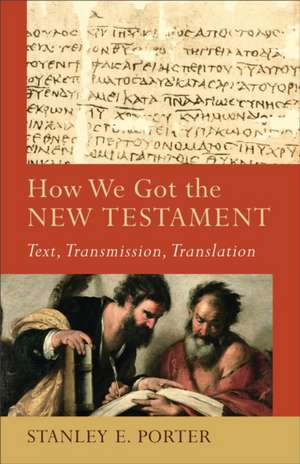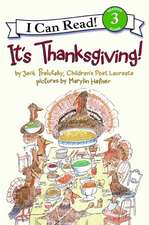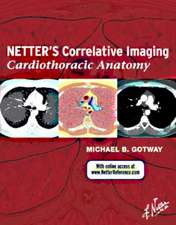How We Got the New Testament – Text, Transmission, Translation
Autor Stanley E. Porter, Craig A. Evans, Lee Mcdonalden Limba Engleză Paperback – 4 noi 2013
Preț: 137.55 lei
Nou
Puncte Express: 206
Preț estimativ în valută:
26.33€ • 28.61$ • 22.13£
26.33€ • 28.61$ • 22.13£
Carte disponibilă
Livrare economică 01-15 aprilie
Livrare express 15-21 martie pentru 21.90 lei
Preluare comenzi: 021 569.72.76
Specificații
ISBN-13: 9780801048715
ISBN-10: 0801048710
Pagini: 240
Ilustrații: black & white illustrations
Dimensiuni: 140 x 216 x 13 mm
Greutate: 0.29 kg
Editura: Baker Publishing Group – Baker Books
Locul publicării:Grand Rapids, United States
ISBN-10: 0801048710
Pagini: 240
Ilustrații: black & white illustrations
Dimensiuni: 140 x 216 x 13 mm
Greutate: 0.29 kg
Editura: Baker Publishing Group – Baker Books
Locul publicării:Grand Rapids, United States
Descriere
A recognized expert in New Testament Greek offers a historical understanding of the writing, transmission, and translation of the New Testament and provides cutting-edge insights into how we got the New Testament in its ancient Greek and modern English forms. In part responding to those who question the New Testament's reliability, Stanley Porter rigorously defends the traditional goals of textual criticism: to establish the original text. He reveals fascinating details about the earliest New Testament manuscripts and shows that the textual evidence supports an early date for the New Testament's formation. He also explores the vital role translation plays in biblical understanding and evaluates various translation theories. The book offers a student-level summary of a vast amount of historical and textual information.
Notă biografică
Stanley E. Porter (PhD, University of Sheffield) is president, dean, and professor of New Testament at McMaster Divinity College in Hamilton, Ontario. A prolific scholar, he has authored or edited dozens of books, including "Fundamentals of New Testament Greek."
Textul de pe ultima copertă
"How We Got the New Testament "is part of the Acadia Studies in Bible and Theology series. Series editors are Craig A. Evans and Lee Martin McDonald.
"Misinformation abounds among both the general public and even some scholars about how carefully the text of the New Testament has been preserved, copied, and translated. Stanley Porter sets the record straight. All three processes have been undertaken with a remarkable degree of care and accuracy. Yet this book is no mere rehash of traditional positions. It is completely up-to-date with the very latest of cutting-edge scholarship in all three areas and offers distinctive proposals for furthering the progress of scholarship as well. Highly recommended."
--Craig L. Blomberg, Denver Seminary
"Text criticism, textual transmission, and translation theory are oft-plowed terrain, but Stanley Porter unearths some little-known nuggets in this deceptively compact and thoroughly researched volume. Well versed and well published in all three fields, Porter offers both nonspecialists and seasoned scholars new insights about the stability of the Greek text, the early formation of the canon, and the rich variety of translation theories. There are also provocative new theses, suggesting different ways to frame these subdisciplines, as well as paths for breaking stalemates and moving forward."
--N. Clayton Croy, Trinity Lutheran Seminary
"This book is filled with personal stories rarely heard, international scholarship seldom reviewed, familiar evidence freshly viewed, and innovative theories in compelling purview. Porter's erudition is amply demonstrated here. But what makes this book "needed "is not its extensive footnotes, not the sweep of its discussion of ancient manuscripts, not the playful command of the history of text criticism or theories of text transmission, not even the respectful retelling of the drama of translation since the LXX. All of these things make the book "useful." What makes it "needed" is the prospective courage, the independent thought, and the gentle but deadly criticism of so many scholarly commonplaces in these fields of research. Use this text in your graduate course (or perhaps undergraduate seminar) on exegesis or text criticism or New Testament introduction. If you have no such course, then create one. Just get students to read it."
--C. Michael Robbins, Azusa Pacific University
"Misinformation abounds among both the general public and even some scholars about how carefully the text of the New Testament has been preserved, copied, and translated. Stanley Porter sets the record straight. All three processes have been undertaken with a remarkable degree of care and accuracy. Yet this book is no mere rehash of traditional positions. It is completely up-to-date with the very latest of cutting-edge scholarship in all three areas and offers distinctive proposals for furthering the progress of scholarship as well. Highly recommended."
--Craig L. Blomberg, Denver Seminary
"Text criticism, textual transmission, and translation theory are oft-plowed terrain, but Stanley Porter unearths some little-known nuggets in this deceptively compact and thoroughly researched volume. Well versed and well published in all three fields, Porter offers both nonspecialists and seasoned scholars new insights about the stability of the Greek text, the early formation of the canon, and the rich variety of translation theories. There are also provocative new theses, suggesting different ways to frame these subdisciplines, as well as paths for breaking stalemates and moving forward."
--N. Clayton Croy, Trinity Lutheran Seminary
"This book is filled with personal stories rarely heard, international scholarship seldom reviewed, familiar evidence freshly viewed, and innovative theories in compelling purview. Porter's erudition is amply demonstrated here. But what makes this book "needed "is not its extensive footnotes, not the sweep of its discussion of ancient manuscripts, not the playful command of the history of text criticism or theories of text transmission, not even the respectful retelling of the drama of translation since the LXX. All of these things make the book "useful." What makes it "needed" is the prospective courage, the independent thought, and the gentle but deadly criticism of so many scholarly commonplaces in these fields of research. Use this text in your graduate course (or perhaps undergraduate seminar) on exegesis or text criticism or New Testament introduction. If you have no such course, then create one. Just get students to read it."
--C. Michael Robbins, Azusa Pacific University











